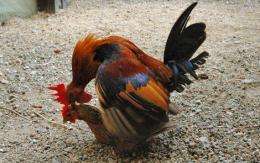Hens' sperm ejection secrets

In reproductive warfare sperm is a male’s ultimate weapon to decide who fathers the next generation.
But a new Oxford University study involving feral chickens has revealed that females fight back: hens are able to eject sperm directly following copulation and, when they do, on average 80% of the ejaculate is expelled.
"Sperm ejection can be an effective way for females to bias a male’s chance of successful fertilization," Rebecca Dean, of Oxford University Department of Zoology explains. This female counter-measure has also been found in worms, insects, and even primates.
The experiments, which involved analyzing the physical characteristics of different cockerels, enabling them to mate with hens, and then collecting the sperm hens eject, tell a complex tale, the researchers report in this month’s American Naturalist.
Whilst large ejaculates suffered a higher risk of ejection, a larger proportion of smaller ejaculates were ‘dumped’ leaving less sperm to fertilize an egg. "Sperm ejection imposes on males an evolutionary dilemma," Rebecca tells me.
"This trade-off between ejection risk and amount of sperm ejected could generate opposing selection on the evolution of sperm allocation strategies in males."
Yet when it comes to having their sperm dumped females don’t treat all males equally: hens were found to be more likely to eject sperm after successive matings, favoring their first partners to the detriment of later ones. They also ejected a larger proportion of the sperm of socially subordinate males, giving more dominant males an advantage.
The results show that promiscuous females can have a strong and predictable influence on the battle between sperm from rival partners. So, even in animals such as chickens - where males can force females to mate - females can nevertheless retain control over the paternity of their offspring.
More information: www.jstor.org/stable/10.1086/66124
Provided by Oxford University













